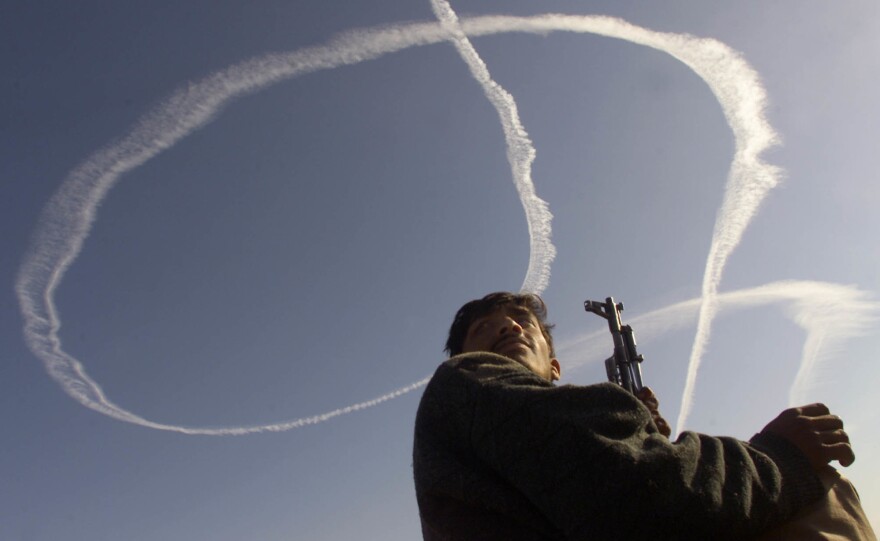As President George W. Bush flew back to Washington on Air Force One on Sept. 11, he was accompanied by Michael Morell, the CIA officer who briefed the president daily.
Morell was in touch with CIA headquarters, which gave him heart-stopping intelligence that he had to urgently deliver to the president.
"The message was that what happened that morning was the first of two waves of attacks against the United States," said Morell. "So here I am sitting with a president who just suffered the largest attack ever on the history of the homeland. And his intelligence briefer was telling him that maybe this was just the first of two."
Of course, there was no second wave, despite the strong fears in the anxious days that followed.
In his first remarks to the nation, Bush said: "The resolve of our great nation is being tested. But make no mistake: We will show the world that we will pass this test."
So here we are, 20 years later. Has the U.S. passed the test? Is the country safer?
NPR asked several former officials who served in senior positions over the past two decades. Their collective answer could be summarized as, "Yes, but ..."
One thing is clear: Al-Qaida carried out several deadly attacks against U.S. targets in the years leading up to 9/11. But since that terrible day, the only lethal attack in the U.S. with a direct link to al-Qaida was a 2019 shooting by a Saudi Arabian aviation student that killed three people at the Pensacola Naval Air Station.
"We are safer. We have done a lot to prevent another major catastrophic attack," said Jane Harman, who was a Democratic congresswoman from California. A leading member of the House Intelligence Committee, she was walking to the Capitol Dome when the 9/11 news broke.
"That dome where I was headed was the intended target of the fourth plane," the one that crashed in Pennsylvania, Harman said. "So, you know, this is kind of personal."
She's quick to add that the U.S. response since 9/11 has included many damaging mistakes. She considers herself among those responsible, ground she covers in a book she authored this year, Insanity Defense.
"What we did wrong going forward was we exceeded the mission" in Afghanistan, she said. "The mission was to degrade the ability of al-Qaida to attack us again. We did that very quickly. But we stayed. There was mission creep. We over-militarized our response."
The other huge misstep, she says, was invading Iraq on the false premise that Saddam Hussein was building weapons of mass destruction or was somehow linked to al-Qaida.
"I supported the resolution on Iraq because I believed that intelligence," said Harman. "So that was a mistake, probably primo number one."

Failing to live up to U.S. values
Doug Lute was known as the "war czar" for Afghanistan and Iraq on the National Security Council under President Bush, and remained on the NSC under President Obama. The retired Army lieutenant general, who also served as U.S. ambassador to NATO, says the U.S. is now safer because of advances in military firepower.
"We literally have the ability to strike anywhere in the world almost overnight," Lute said. "We can do it from the air. We can do it from systems launched at sea. We can do it with people on the ground."
But, he adds, the U.S. inflicted considerable harm on itself for failing to live up to its values, at home and abroad.
"You see a slippage in democratic values here in the United States. It's hard to refute after witnessing the example of Jan. 6," he said in reference riot that ensued when supporters of then-President Donald Trump who stormed the Capitol.
"But also overseas. I mean, this notion of extreme interrogation measures, a euphemism for torture, certainly that's not in accordance with American values."
An expanding list of threats
Janet Napolitano, who ran the Department of Homeland Security under Obama, said the country needs to think more broadly about the definition of national security.
Her list includes border security, ransomware attack, pandemics, mass shootings, natural disasters, as well as disinformation.
In her 2019 book, How Safe Are We?, she defends Homeland Security against critics who consider it a massive, unwieldly bureaucracy trying to do too many different things.
She says the department's many agencies are needed to deal with threats that keep changing.
"The risk environment evolves," she said. "It would be virtually impossible for hijackers to take over commercial airliners and weaponize them. On the other hand, risks due to cyberattacks have only continued to increase."
What would Osama bin Laden think?
Michael Morell, who is retired from the CIA after serving as deputy director, has a podcast, Intelligence Matters, and says he still tries to get inside the head of old adversaries. He wonders what Osama bin Laden would think if he were still alive.
"I think he would be pretty happy," Morell said. "He would look at the number of extremists in the world today, and he would see a number much larger than existed on Sept. 10, 2001. He would also believe that he had weakened America as a result of the wars in Afghanistan and in Iraq, not only militarily, but politically."
Yes, Morell says, we are safer. We passed the test. But we've suffered some real damage along the way.
Greg Myre is an NPR national security correspondent. Follow him @gregmyre1.
Copyright 2021 NPR. To see more, visit https://www.npr.org.



